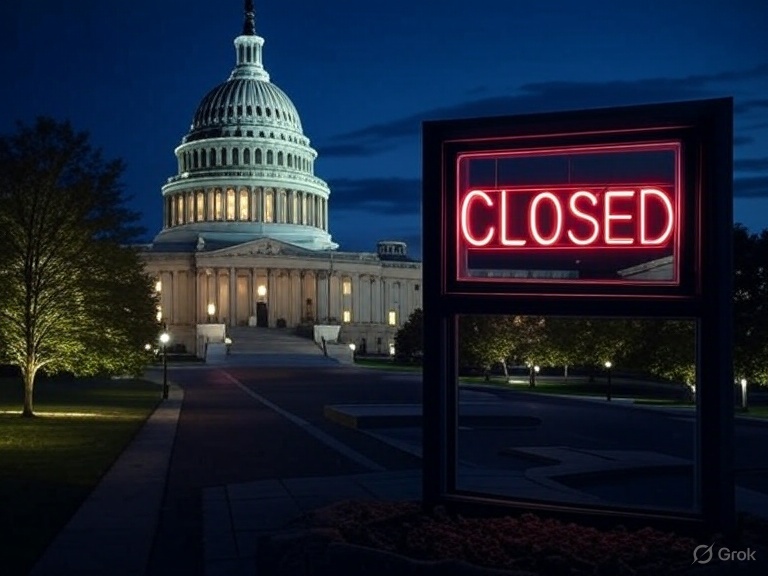The Basics
The federal government shut down on October 1st, and we’re now into day two.
Hundreds of thousands of government workers are either furloughed or working without immediate pay—though they’ll likely get back pay once this ends. Some national parks have limited access, passport processing is delayed, and various government services are disrupted, though essential operations like TSA, mail delivery, and the military continue running.
But what’s this fight really about?
The Money Fight
Here’s where things get interesting. Republicans say they want to pass a funding bill to keep the government running. Democrats won’t vote for it. Why? It comes down to healthcare money.
The issue centers on subsidies for the Affordable Care Act—you know it as Obamacare. These subsidies help about 24 million Americans afford their health insurance premiums. Without them, people’s monthly bills could jump significantly.
Republicans claim Democrats are holding up the budget because they want to make sure undocumented immigrants can get taxpayer-funded healthcare through these ACA subsidies. Democrats say that’s not true at all. They argue they’re simply trying to protect subsidies that help millions of American citizens avoid massive premium increases.
What’s Actually True?
Let’s clear something up. Fact-checkers confirm that undocumented immigrants cannot legally receive ACA subsidies. The law doesn’t allow it. Never has.
However, there is one healthcare program that does help undocumented people in emergency situations. Since 1986—under President Reagan—hospitals have been required to treat anyone who shows up in an emergency room, regardless of immigration status. Emergency Medicaid reimburses hospitals for some of this care. But that’s very different from regular health insurance subsidies.
Why Conservatives Should Care
For those of us who believe in limited government and fiscal responsibility, this shutdown raises important questions.
First, there’s the spending issue. President Trump posted on social media that Republicans should use this moment to “clear out dead wood, waste, and fraud” and save billions of dollars. That resonates with many conservatives who think Washington spends too much money on too many things.
Second, there’s the ACA itself. Many conservatives never liked Obamacare to begin with. We argued it was government overreach—forcing people to buy insurance they didn’t want and making taxpayers subsidize other people’s healthcare choices.
The subsidies in question were supposed to be temporary. They were expanded during COVID and then extended. Now they’re set to expire, and Democrats want them made permanent. That means more government spending, forever.
Nevada’s Voice in the Shutdown Battle
Nevada’s elected leaders are taking different sides in this fight, showing just how divisive the issue has become.
Senator Catherine Cortez Masto, a Democrat, broke with most of her party and voted with Republicans to try to pass the funding bill. She was one of only three Democrats or independents to cross party lines. But she’s not happy about it, saying:
“President Trump and Congressional Republicans are already hurting Nevadans who are dealing with high costs, an economic slowdown, and a looming health care crisis,”
Cortez Masto said:
“This administration doesn’t care about Nevadans, but I do. That’s why I cannot support a costly shutdown that would hurt Nevada families and hand even more power to this reckless administration.”
She says about 100,000 Nevadans would see their health insurance premiums increase if the subsidies expire. More than 20,000 Nevadans might not be able to afford healthcare at all.
Senator Jacky Rosen, Nevada’s other Democratic senator, is pushing hard for the subsidies to continue. She gave a speech on the Senate floor warning about what’s coming.
Rosen said:
“Every single person in this country, their premiums are about to go up, probably double. 24, 25 million are going to get kicked off their health care right away. Others might not be able to afford it. This impacts everyone.”
Rosen says nearly 95,000 Nevadans benefit from these enhanced tax credits. She visited a health center in Carson City last week and talked to reporters about Republicans:
“They won’t come to the table. They’ve been really stubborn. I don’t understand it.”
Governor Joe Lombardo, a Republican, called the shutdown “unnecessary” and said he’s disappointed in Washington’s gridlock.
Lombardo said:
“While I appreciate the leadership of Republicans and some select Democrats in Washington to avoid a government shutdown, I’m disappointed in the continued gridlock that allowed this to happen.”
The state is monitoring the situation and trying to figure out how it will affect Nevada’s budget and services.
What Happens Next?
Someone has to blink. Either Republicans and Democrats find a compromise, or this shutdown continues. The longer it drags on, the more people feel the pain. Federal workers miss paychecks. Services stop. The public gets frustrated.
History tells us these standoffs usually end with both sides claiming some kind of victory. But the real question is whether anything actually changes.
What You Can Do
If you’re concerned about government spending and overreach, now’s the time to make your voice heard. Call your representatives in Congress. Tell them where you stand on healthcare subsidies and government funding.
Do you think these subsidies should continue? Or do you believe it’s time to let them expire and force the healthcare market to adjust? Should we be spending billions on subsidies at all?
These are questions worth asking. Whether the government is open or closed, the fundamental debate remains: How big should government be? How much should it spend? And who should pay for it?
The shutdown might end tomorrow or drag on for weeks. But the bigger argument about the size and role of government isn’t going anywhere. That’s the conversation conservatives need to keep having—with our neighbors, our representatives, and ourselves.
The opinions expressed by contributors are their own and do not necessarily represent the views of Nevada News & Views. This article was written with the assistance of AI. Please verify information and consult additional sources as needed.



